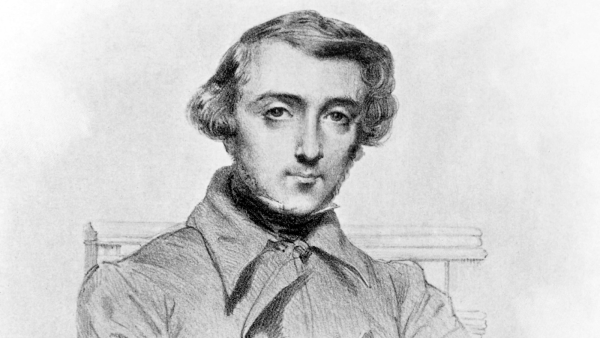

President Joe Biden in his farewell speech warned of the threat of oligarchy to democracy and freedom. Most would be surprised by the connection between the threat of oligarchy that the president highlighted and what most Americans support, namely a healthy civil society.
It is now routine to hear about the polarization, fragmentation, and crisis of loneliness in American democracy. Many have thought that declining civic health could be restored through a revitalization of civil society and a rebuilding of solidarity. A primary source for that perspective that is shared across the political spectrum is Alexis de Tocqueville’s Democracy in America.
One of the most famous passages of this 19th-century French thinker’s two-volume work is his praise of our civil society: “Americans of all ages, all conditions, all minds constantly unite. Not only do they have commercial and industrial associations in which all take part, but they also have a thousand other kinds: religious, moral, grave, futile, very general, and very particular, immense and very small.”
It is a passage quoted almost as frequently as the famous lines of American presidents (“Ask not what your country can do for you …”).
Tocqueville saw in civil society a cure for perceived ills associated with the decline of aristocracy during the period in which he wrote. He thought this decline had a destabilizing and isolating effect for individuals. Each had had a place and purpose within aristocracy in the great chain of being, whether they liked it or not. Democracy, as he said, breaks that chain.
Tocqueville saw in civil society a cure for perceived ills associated with the decline of aristocracy during the period in which he wrote.
Civil society, however, rebuilt connections; in the ordinary activities of daily life, Americans identified with each other, they learned how to cooperate, their interests were enlarged, and they built connections and forms of solidarity.
This unleashing of human energy and the vibrancy of civil society in the absence of European aristocracy shaped values and expectations. While aristocracy in Tocqueville’s account tended to encourage civic apathy and ennui, he wrote in astonished tones about how Americans would simply take things into their own hands. They did not wait for the state, a local bureaucrat, or someone from the upper classes to make things happen. One might say that America’s legacy of innovation and entrepreneurial spirit emerged because of the absence of the hierarchies of Old World politics.
One might say that America’s legacy of innovation and entrepreneurial spirit emerged because of the absence of the hierarchies of Old World politics.
Biden’s concern about oligarchy is that the concentration of economic and political power in the hands of the few means they can set the rules in their favor. Rules to which the rest of us must obey.
Toward the very end of Democracy in America, Tocqueville warned about the emergence of a type of aristocracy grounded in steep inequality in wealth and power. "As the mass of the nation turns to democracy, the particular class occupied with industry becomes more aristocratic,” he wrote. Those with concentrated wealth and power will dominate the rest: “The one is in a continual, strict, and necessary dependence on the other, and he seems born to obey as the latter is to command. What is this if not aristocracy?”
Tocqueville warned about the emergence of a type of aristocracy grounded in steep inequality in wealth and power. He wrote, “as the mass of the nation turns to democracy, the particular class occupied with industry becomes more aristocratic.”
Oligarchy in Tocqueville’s work is a form of aristocracy—in which the rule of some over others is based on some measure, be it wisdom, “good birth,” or wealth. The measure is not the equal moral worth of individuals. That is the moral grounds for democracy.
Tocqueville broadly suggests that a thriving civil society that could build or rebuild solidarity needs democracy. Cooperative activity in the associations of civil society, which democratic institutions facilitate, is the basis for building bonds that makes future acting together possible. Oligarchical rule threatens more than just the narrow political order. It will seep into the routine behaviors of citizens and their relationships with one another.
For those worried about the social and political trends in American democracy and who think a solution rests in the revival of civil society and the rebuilding of bonds between citizens, read Democracy in America to its end. The invocation of the harms of oligarchy will be both alarming and enlightening.
Reprinted from an op-ed originally published in The Virginian-Pilot on February 3, 2025.